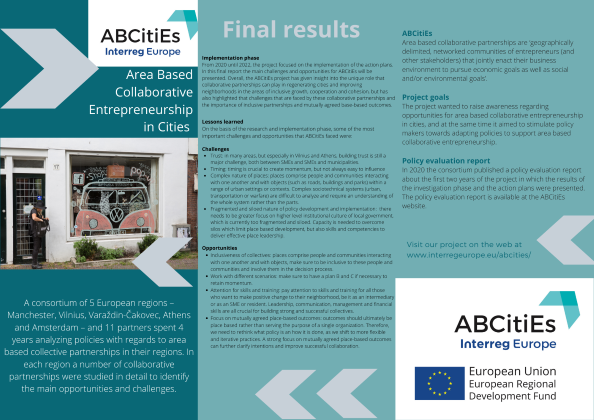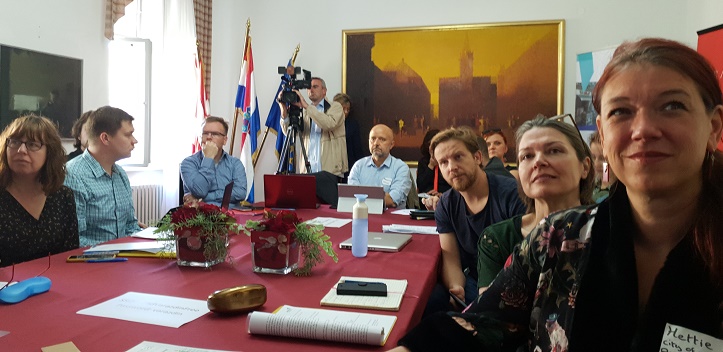Aiming to provide hands-on tools for local governments to experiment with, ABCitiEs focuses on the how questions. How do ABCE function? What are the policies that support or frustrate ABCE? How can these policies be improved? The question why local governments want to support ABCE is not addressed directly.
By Iris Hagemans
It makes sense, because the potential benefits of ABCE over state or market regulation are well established within the commons literature. Market exchanges produce externalities that are not reflected in the price of goods and therefore not regulated by demand and supply. Managing these undesired outcomes is traditionally seen as the role of the state. However, this requires regulation that is well-defined and generic, to be applied legitimately in different contexts. By comparison, ABCE can find more intuitive and context-specific ways to manage local issues. This can make them more efficient and effective. Moreover, collectively designed interventions could be perceived as more legitimate and fair. Finally, by creating commitment among local stakeholders, ABCE can have a spin-off effects and lead to further interventions. No wonder local governments all over Europe aim to promote this phenomenon. Our meeting in Athens showed that while all five cities in the ABCitiEs project shared positive expectations of collectives, they do so for different reasons.
For the city of Athens, the key advantage of ABCE seems to lie in their effectiveness. Collectives can get things done that the municipality currently does not have the resources to do. Athens has been hit hard by the Global Financial Crisis. Extensive budget cuts have forced the city to reprioritize, focusing on the most essential services. This is a difficult task when at the same time the city faces big social, economic, and environmental challenges. Fortunately, collectives have filled some of the gaps where the local government is forced to take a step back.
In Manchester, efficiency of ABCE seems to be the main expected benefit. Just like Athens, the city of Manchester has had to deal with far-reaching budget cutbacks. These started as a consequence of the Global Financial Crisis, but continued due to policies of centralization and privatization. For local governments, this means that they are no longer able to provide all the services they used to provide. This is difficult to accept, since the level of expectations from the local population as well as the level of ambition from civil servant do not change overnight. Working together with collectives allows the local government to keep up its service level with a decreasing budget.
The main challenge for Amsterdam was that collectives started asking the government to do more than it is currently doing. The collectives wished to tackle the issues currently addressed by the local government with more ambition. Beyond keeping the environment clean and well-maintained, the collectives aim to make it smart, sustainable, healthy and attractive. Supporting ABCE therefore becomes a process of allowing them to take over some of the tasks traditionally carried out by the local government. More than an explicit wish, the emergence of ABCE in Amsterdam was therefore a fact that the local government simply had to deal with.
The same is true in Vilnius. An artist colony settled in one of the inner city neighborhoods and even presents itself as an alternative ‘state’. With such an overt claim to being independent and subversive, it is hard to imagine a role for the local government in this collective. Still, the interesting, creative environment that this collective has created is highly appreciated by the city of Vilnius.
The place-specific benefits of atmosphere and innovation also play an important role in Varazdin. The main difference with the case in Vilnius is that the collectives have yet to emerge. A number of empty buildings in the city motivated the local government to look at collectives that could locate there. Rather than a lack of resources, these buildings form a surplus with which the local government expects collectives to achieve more positive outcomes than state-led initiatives could.
Whether it is their effectiveness, efficiency, legitimacy, ambition or positive effects on the local environment, in all cases the collective offer something the (local) government cannot provide. Furthermore, the benefits provided by ABCE may change over time and across cases within the same cities. Regardless of the different motivations to support collectives, however, cities face similar challenges in the ways to promote and support them. The ABCitiEs project aims to provide local governments with new tools to address these challenges. The effect on the way these collectives function will be thoroughly monitored. Nevertheless, it would be interesting to revisit the underlying motivations as well. Perhaps the benefits of ABCE take a very different form to what is currently expected.













